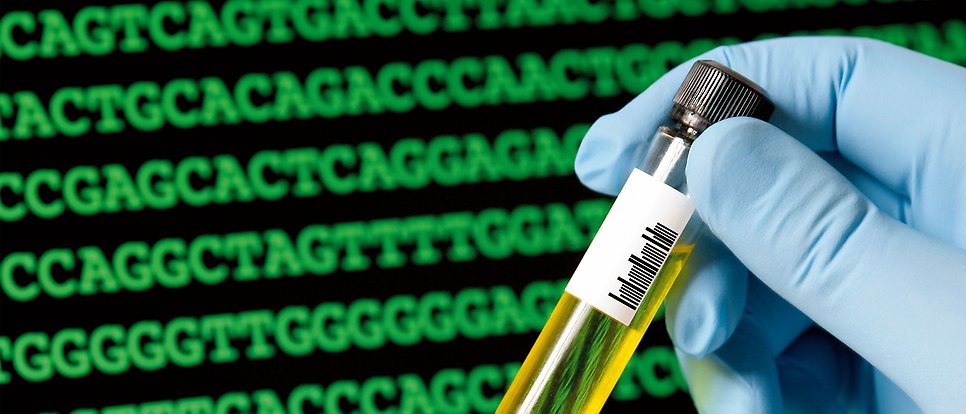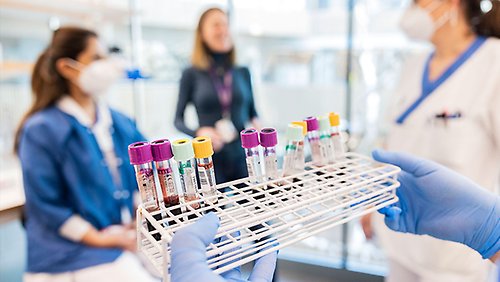Master's Programme in Forensic Science
120 credits

Most crime scenes have traces left by a perpetrator. A genetic, chemical, or toxicological analysis of the traces can play a critical role in an investigation and may lead to a conviction in a court trial. The methods used for analysing evidence are in continuous development making forensic science a rapidly growing field. The Master's Programme in Forensic Science will enable you to meet the increasing need for academic knowledge, competence, and research.
Autumn 2023 Autumn 2023, Uppsala, 100%, On-campus, English
- Location
- Uppsala
- Pace of study
- 100%
- Teaching form
- On-campus
- Instructional time
- Daytime
- Start date
- 28 August 2023
- Language of instruction
- English
- Entry requirements
-
Academic requirements
A Bachelor's degree, equivalent to a Swedish Kandidatexamen, from an internationally recognised university. The degree must be in biology, biomedicine, molecular biology, chemistry or a similar field. Also required is:
- organic/inorganic chemistry or analytical chemistry totalling 15 credits; and
- courses in genetics or cell/molecular biology totalling 15 credits.
Language requirements
Proficiency in English equivalent to the Swedish upper secondary course English 6. This requirement can be met either by achieving the required score on an internationally recognised test, or by previous upper secondary or university studies in some countries. Detailed instructions on how to provide evidence of your English proficiency are available at universityadmissions.se.
- Selection
-
Students are selected based on an overall appraisal of previous university studies, a statement of purpose and relevant work experience.
Tuition fee-paying students and non-paying students are admitted on the same grounds but in different selection groups.
- Fees
-
If you are not a citizen of a European Union (EU) or European Economic Area (EEA) country, or Switzerland, you are required to pay application and tuition fees.
- Application fee: SEK 900
- First tuition fee instalment: SEK 72,500
- Total tuition fee: SEK 290,000
- Application deadline
- 16 January 2023
- Application code
- UU-M3855
- Additional information
-
In addition to the general supporting documents, you also need to submit the following programme-specific documents:
- an application summary sheet Pdf, 359 kB.
- document(s) and/or letter(s) of recommendation certifying your previous experience (if applicable).
Check the application guide for information on how to apply and what other supporting documents you need to submit.
Autumn 2024 Autumn 2024, Uppsala, 100%, On-campus, English
- Location
- Uppsala
- Pace of study
- 100%
- Teaching form
- On-campus
- Instructional time
- Daytime
- Start date
- 2 September 2024
- Language of instruction
- English
- Entry requirements
-
Academic requirements
A Bachelor's degree, equivalent to a Swedish Kandidatexamen, from an internationally recognised university. The degree must be in biology, biomedicine, molecular biology, chemistry or a similar field. Also required is:
- organic/inorganic chemistry or analytical chemistry totalling 15 credits; and
- courses in genetics or cell/molecular biology totalling 15 credits.
Language requirements
Proficiency in English equivalent to the Swedish upper secondary course English 6. This requirement can be met either by achieving the required score on an internationally recognised test, or by previous upper secondary or university studies in some countries. Detailed instructions on how to provide evidence of your English proficiency are available at universityadmissions.se.
- Selection
-
Students are selected based on an overall appraisal of previous university studies, a statement of purpose and relevant work experience.
Tuition fee-paying students and non-paying students are admitted on the same grounds but in different selection groups.
- Fees
-
If you are not a citizen of a European Union (EU) or European Economic Area (EEA) country, or Switzerland, you are required to pay application and tuition fees.
- Application fee: SEK 900
- First tuition fee instalment: SEK 72,500
- Total tuition fee: SEK 290,000
- Application deadline
- 15 January 2024
- Application code
- UU-M3855
- Additional information
-
In addition to the general supporting documents, you also need to submit the following programme-specific documents:
- an application summary sheet Pdf, 359 kB.
- document(s) and/or letter(s) of recommendation certifying your previous experience (if applicable).
Check the application guide for information on how to apply and what other supporting documents you need to submit.
About the programme
The aim of the Master's Programme in Forensic Science is to give a broad as well as deep knowledge within the field of forensic science. Several of the laboratory exercises in the programme are connected to criminalistics and are based on recent research. However, the methods are general and also used in many other fields besides forensic science, for example, in medicine, environmental monitoring, pharmaceuticals, the food industry, and the biotech industry. You will, moreover, be trained in critical thinking and analysis of information and results, skills which are essential in all scientific areas.
The programme gives you an in-depth understanding of the applications of biological and chemical analyses within the legal system. This includes knowledge of human genetics, criminalistics, forensic genetics, forensic medicine, law, psychology, forensic chemistry, and analytical chemistry.
During the programme you can expect to:
- independently carry out forensic analyses, apply statistical methods, and evaluate your results,
- have access to excellent laboratory facilities,
- acquire forensic competence and research experience.
The programme is an education with close ties to research and has received the highest possible quality credential in an evaluation by the Swedish Higher Education Authority.
Student profile
You want a broad international education that can lead you in many directions within for example forensics, molecular biology, toxicology, or analytical chemistry. You have an analytical mindset and can express your thoughts and views in speech and writing. Talking and writing in English is fine with you and you expect a mutual exchange with your peer students in an international environment with different experiences and knowledge. During your Bachelor's studies, you also gained experience in laboratory work.
A future PhD education is a possibility you have thought about, and you will value the opportunity to get in contact with current research in several areas. You also appreciate the option to apply your knowledge during an internship within academia, industry, the Police authority, or abroad within many different topics (the topic is not restricted to forensic science).
Degree
The programme leads to the degree of Master of Medical Science (120 credits) with Forensic Science as the main field of study.
Content
During the first year, you will attend five courses that give you a broad knowledge of forensic work, from when a crime has been committed until a verdict is reached in court. In the first semester, you will learn about medical genetics, crime scene investigations, forensic analyses, forensic genetics, and forensic medicine. During semester two, you will learn about the legal system, the evaluation of evidence in criminal cases, and chemical analysis methods of evidence. The courses are organised by researchers with expertise in their respective fields, with many lecturers invited from the Police Authority, the National Forensic Center, and the National Board of Forensic Medicine.
In parallel with the courses throughout the first semester, you will participate in a lecture series in professional training, which includes presentation techniques, research ethics, cultural intelligence, and many more topics.
Year two begins with further in-depth studies of analytical chemistry, followed by an elective period. During this period, you can either take a 15-credit elective course or extend your degree project from 30 to 45 credits. You can carry out the degree project at, for example, a forensic laboratory, a company, a university, or a government agency. It can also be done abroad and in many different subject areas (the subject is not limited to forensic science).
Courses within the programme
Semester 1
- Medical Genetics, 7.5 credits
- Forensic Science and Criminalistics, 7.5 credits
- Forensic Genetics and Medicine, 15 credits
Semester 2
- Law, Psychology, and Forensic Expertise, 15 credits
- Forensic Chemistry, 15 credits
Semester 3
- Analytical Methods in Forensic Science, 15 credits
- Elective period, 15 credits or Degree Project, 45 credits
Semester 4
- Degree Project, 30 credits
Learning experience
The Master's Programme in Forensic Science is given in a small international group (approximately 20 students), and the instruction includes lectures, individual work with projects, laboratory work, group work and demonstrations.
Lectures are mixed with laborations, and you will work with compilation of information from laboratory work, evaluation of scientific articles, and critical review of scientific texts and results. Your achievements will be assessed by examinations, seminars, and projects.
Attendance is compulsory at all scheduled sessions, including demonstrations, group instructions, seminars, laboratory work, and an autopsy demonstration.
The programme is given entirely in English and requires full-time studies in Uppsala.
Career
The programme prepares you for forensic work within the police authority or at forensic laboratories. For example, you can work with analysis of DNA, fingerprints, shoeprints, tool marks, or toxic compounds.
With broad and deep knowledge of biology and chemistry, you are prepared to work in many other areas, such as academia, the food industry, environmental monitoring, and pharmaceutical or biotechnology industries. Our alumni work, for example, as laboratory engineers, chemists, quality assurance officers, and life science consultants. Many students also choose to pursue a PhD after graduation.
About a third of our alumni students work at Swedish or foreign authorities within forensic science as, for example, forensic experts or crime scene investigators, and one-third work in academic research or in the private sector. A majority of the students find their first job before or within six months after graduation.
Career support
During your time as a student, UU Careers offers support and guidance. You have the opportunity to take part in a variety of activities and events that will prepare you for your future career.
Is this programme right for you?
Read interviews with our students and watch our programme video.

Studies in medicine and pharmacy
Watch our video about the Disciplinary Domain of Medicine and Pharmacy.

Register your interest
Keep updated about the application process.

Programme syllabus
- Programme syllabus valid from Autumn 2023
- Programme syllabus valid from Autumn 2022
- Programme syllabus valid from Autumn 2019
- Programme syllabus valid from Autumn 2008, version 8
- Programme syllabus valid from Autumn 2008, version 7
- Programme syllabus valid from Autumn 2008, version 6
- Programme syllabus valid from Autumn 2008, version 5
- Programme syllabus valid from Autumn 2008, version 4
- Programme syllabus valid from Autumn 2008, version 3
- Programme syllabus valid from Autumn 2008, version 2
- Programme syllabus valid from Autumn 2008, version 1
Contact
- For programme-specific information, please contact Marie Allen:
- marie.allen@igp.uu.se
- +46 18 471 48 03
- For general information or questions about the Master´s Programmes at the Faculty of Medicine, please contact:
- medmaster@uu.se
- Book an appointment with a study counsellor at the Faculty.
- For admissions-related or general information, please contact our central applicant support team:
- masterprogrammes@uu.se
Students
As a student you will find information about your studies in the student gateway.
